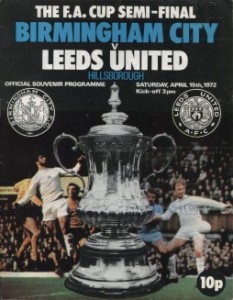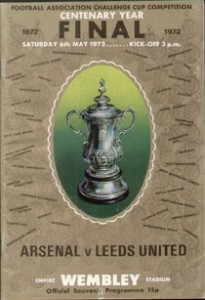 The alarm woke me at some ungodly hour and it was raining. It wasn’t supposed to rain. Cup Final days are always sunny. Nonetheless, I had a coach to catch so sulking in bed wasn’t an option. Breakfast was, indeed, fast and armed with some food lined up by my mum, I was soon on my way down through the estate to the main road pick-up point for the esteemed Hargreaves of Morley, Motor Coach Co. Ltd.
The alarm woke me at some ungodly hour and it was raining. It wasn’t supposed to rain. Cup Final days are always sunny. Nonetheless, I had a coach to catch so sulking in bed wasn’t an option. Breakfast was, indeed, fast and armed with some food lined up by my mum, I was soon on my way down through the estate to the main road pick-up point for the esteemed Hargreaves of Morley, Motor Coach Co. Ltd.
I had been promised it would stop on the corner for me but I was sceptical and, with no one else around so early on a Saturday morning, I was already thinking if I had a Plan B which could get me to Wembley on time. I peered into the distance. Six thirty, and at least the rain had eased to drizzle. Almost miraculously an approaching vehicle started to resemble the very coach. What’s more, it actually stopped for me and I was soon sitting down, rather incredulously, along with a handful of forlorn looking individuals. Such a low-key start. I found it incredible to believe anything momentous could happen that day, especially starting out from a place called Drighlington.
And yet…and yet as we passed through Gildersome on our way to Morley, with more and more people clambering aboard, a creeping feeling began to grow that it was for real. By the time we had stopped at Tingley, prior to the M1 motorway, the bus was actually full. Early shyness and Yorkshire inhibition began to melt as scarves and banners flowered. All the way down, past Sheffield into Derbyshire then the Midlands, conversation rolled on. Leeds had lost two finals already – to Liverpool and Chelsea – surely we had to win at last? Well, I felt confident since I was going this time. I had collected enough tokens from home and away programmes to qualify, so I reckoned I had earned the right to be there.
Two hundred miles to London. Two hundred miles of anticipation, added to by seeing the growing number of other coaches and the stream of cars with Leeds scarves trailing from their windows. I thought, too, of all the fans going by train and those who were making their way from other parts of England. Arsenal might have done the Double the previous year but Leeds were one of the best club sides in the world. Their support base was growing but most of those travelling from elsewhere on that day were exiled Yorkshiremen.
One thing I had noticed during those miles was that it was not even drizzling any more. The signs were good and by the time we reached the last Services before London, it all just seemed to be falling in to place. Mind you, there was one positively surreal experience as we began to leave the Service Station. A luxury coach full of spaced out, sunglass-masked hairies from the U.S. of A. was parked alongside. As each driver started up, ready to take us on our separate ways, with paths never to cross again, both sets of passengers marvelled at the mutual weirdness of the other. I’m sure they enjoyed their trip.
The North Circular Road and the frustration of being so near and yet so far from the ground. I wanted everybody not going to the match to get off the road but queuing in traffic has always been part of the London Experience. Wembley finally hove into view and I suppose the crawling traffic probably built up the fun. We pulled in to a huge coach park and fled the bus. After all, it was only two hours to kick off. Family and friends at home would be close to their televisions, mostly black and white sets, still, unless you were posh. The old favourites; ‘Meet the Teams’ and ‘The Road to Wembley’, would have a special significance on this day of days. I had literally just travelled that road. The cameras panning down Wembley Way would show us this time, mingling with the red and white of Arsenal, our Northern vowels proudly proclaiming how English should be truly pronounced. This was not the Cap Foinoo.
Having joined the huge flow of people near the end of Wembley Way, it was good to see fans of both clubs walking peaceably along together but it was wonderful to see the two rivers diverge as we neared the stadium. Suddenly, I was amongst none but Leeds fans, a slow-moving phalanx making for the entrances at the Tunnel End. I wanted to get in to the ground as soon as I possibly could. Queuing at the austere, barred gates had a wonder of its own. Aged 19, the biggest crowd I had been in up to then was a fairly impressive 63,000 but this would be the magical number of 100,000. The scale of it all was compelling.
In dreaming of going to Wembley, perhaps the one sight I most keenly anticipated was the first view of the field. Television elongates and so cheats. What surprised me as I stood at the top of the terracing was its ordinariness. It was just a football field after all. It’s strange how stadiums grow in size once the crowd is in place. Yet the pitch looked lovely in the brightening day as I made my way from the top of the higher section down towards the front. There, I was right in the heart of the Leeds fans, slightly to the left of the players’ tunnel. Six years previously, England had lifted the World Cup. I had watched from a hotel in Cornwall. Now I was actually here, at what they called the home of football. We had rented it for the day.
I’d heard tell of people selling Cup Final tickets cheaply and I heard of people who went even though they didn’t like football, just because they had free tickets. I knew there was not a chance of me selling that ticket. How can money compare?
The pre-match build-up inside the ground was a crucial part of the whole experience in those days and it was exciting just watching the crowd grow, listening as chant after chant built up the atmosphere. At Elland Road and elsewhere, the terraces were flat but the huge curve at Wembley allowed the supporters to see each other much more easily. It added to the fun of singing and shouting as kick off drew steadily nearer and we outshouted the Arsenal fans from start to finish. I had the sense that their spirits were not as high as ours at any point. It was the northerners who sang ‘Abide With Me’ with most feeling and when Tommy Steele called on each set of fans to cheer for their team, one after the other, the Leeds roar seemed much louder. The tone for the whole match had been set as 20,000 voices fused into just one.
It was warm. I had a coat and just had to drop it by my feet. There was plenty of room, though, and I was impressed by the size of each step on the concrete terraces. It might have been tiring standing up but it was more fun, more intimate and chummy than today’s armchair football. I didn’t know anyone around me when I arrived, by the end we were treating each other like lifelong friends and that included the man in the cowboy hat who amused all those around him by emitting nothing but barking sounds all afternoon.
Before the players came on, there was a parade to mark the F.A.’s Centenary with each past winner, represented, I think, by some London school kids in replica kits. It was ok. Seeing the Queen was ok, too, but I wanted to see the Whites come marching in. In time, they did, led by Don Revie and then Billy Bremner. With them leading Leeds, I’m amazed we ever lost. Both teams came out alongside each other. It was fantastic to see and hear the whole ground cheering and waving; white, blue and yellow, red and white, together for the one and only time. The teams lined up along the halfway for the pre-match ceremonies. Such preliminaries as singing the national anthem and the teams being presented to our esteemed monarch seemed akin to being back on the North Circular. I just wanted them to get on with the match.
The game itself was a delight even though the standard of football was only ‘good’ not ‘great’. The delight lay in the fact that after Paul Reaney cleared Alan Ball’s shot off the line, I became increasingly sure we would win. Allan Clarke’s reflex header onto the bar following Lorimer’s volley deserved a goal but Leeds did what Leeds did best, they controlled the game. Watching the game on classic video footage can only give an impression since it has already happened and you know that. You can never recapture the first viewing. So when Mick Jones broke down the right and pulled the ball back from the by-line, there was a split-second of nerve-tingling anticipation. I was perfectly in line, behind the goal to see Clarke’s precision header coming straight towards me. I knew it was a goal all the way. Barnett’s dive was nothing more than despairing. Sometimes in the past, Leeds had slipped up but I knew, then, that we had won the cup.
The final whistle fixed that fact forever. The hazy sun had been shining for much of the game, after all, it was the Cup Final. Billy Bremner collected the trophy from the Queen and then lifted it aloft to us. The lap of honour was aimed at us. We had sung them home during the match. The Whites were marching in and I was in that number as the players came towards us, Johnny Giles bringing his little children along to share in the joy. The first part of the lap took the players past the emptying Arsenal end. It was merely the prelude to them rounding for the Tunnel End so that they could build up to reaching the heart of the Leeds fans. After so many disappointments, the team were able to celebrate winning the greatest Cup in the world. Such happiness too on our terraces. The lads I had befriended invited me to go back to Leeds with them but I would be expected on the coach so had to regretfully decline. It summed up, though, how all Leeds fans were friends that day. No one wanted to leave, only once the players had finally gone down the tunnel did we gradually drift happily away.
Outside, the Arsenal fans had mostly shot off home, it was only a few miles for them anyway. Wembley was ours. Jubilant Leeds fans were milling about; euphoric, ecstatic, overjoyed as I made my way back to the coach park. It had been fairly empty when we arrived, now it was almost full. I don’t really know how I found the Hargreaves Coach but eventually I did and, having queued our way out, a happy bus set off home in the beautiful late evening sunshine. Circling round towards the M1, I had one last view of the distant Wembley before it passed out of sight and we hurried away to see the game on Match of the Day.
Part of the mighty convoy, we made it back in time and I was able to tell the tale to my Leeds–mad sister, then my friends. Watching the highlights was when I first heard the commentary that accompanied the goal, nice and clipped, no extras needed, “Clarke, one nil.” The day’s end had to come and at bedtime I was left to reflect that hundreds of teams had entered the Cup, professional and amateur, but only one team could win. That day it was our turn, the turn of Leeds United. It was a perfect day.
Author: Graeme Garvey
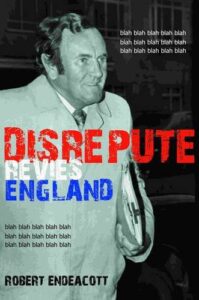 The true story of Don Revie’s three years as England manager, 1974 – 1977; the follow-up to Dirty Leeds.
The true story of Don Revie’s three years as England manager, 1974 – 1977; the follow-up to Dirty Leeds.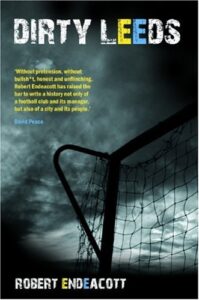 Players such as Gary Sprake, Paul Reaney, Terry Cooper, Billy Bremner, Jack Charlton, Norman Hunter, Peter Lorimer, Allan Clarke, Mick Jones, John Giles, Eddie Gray, Paul Madeley, Bobby Collins, John Charles, Willie Bell, Albert Johanneson and Mick Bates – all managed by Don Revie. The famous Leeds United AFC – the team they love to hate, run by the man they love to hate. Thirteen years, thirteen chapters. Thirteen, unlucky for some…
Players such as Gary Sprake, Paul Reaney, Terry Cooper, Billy Bremner, Jack Charlton, Norman Hunter, Peter Lorimer, Allan Clarke, Mick Jones, John Giles, Eddie Gray, Paul Madeley, Bobby Collins, John Charles, Willie Bell, Albert Johanneson and Mick Bates – all managed by Don Revie. The famous Leeds United AFC – the team they love to hate, run by the man they love to hate. Thirteen years, thirteen chapters. Thirteen, unlucky for some…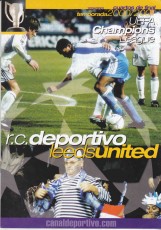 During Leeds United’s amazing run to the semi-finals of the Champions’ League in 2000/2001 one moment stood out in particular. The choice might seem strange with so much to pick from. It was, perhaps surprisingly, not a goal, not even Dom Matteo’s effing great goal in the San Siro and it wasn’t a great tackle by a Leeds defender, a goal-line clearance, a stunning save or that blooper by A.C. Milan’s goalie that allowed Bowyer’s 89th minute shot through. There were plenty of all these great memories which have since been firmly absorbed into United’s folklore.
During Leeds United’s amazing run to the semi-finals of the Champions’ League in 2000/2001 one moment stood out in particular. The choice might seem strange with so much to pick from. It was, perhaps surprisingly, not a goal, not even Dom Matteo’s effing great goal in the San Siro and it wasn’t a great tackle by a Leeds defender, a goal-line clearance, a stunning save or that blooper by A.C. Milan’s goalie that allowed Bowyer’s 89th minute shot through. There were plenty of all these great memories which have since been firmly absorbed into United’s folklore.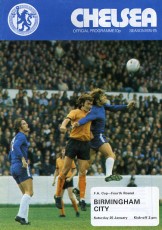 My match day experience is not complete unless I am able to get a programme. Over the years there have been just four games when this has happened. Thanks to the Internet the ability to try and get hold of those missing programmes has become easier. Just this week I managed to track down one of the missing four. The game in question was an FA Cup 4th Round game between Chelsea and Birmingham City at Stamford Bridge in 1975. One of the things about programmes for me is the memories that they evoke, in the same way songs, smells or photographs do for other people. They are in their own way a piece of social history. But it is also for me about being there, the shared experience and a confirming of your existence.
My match day experience is not complete unless I am able to get a programme. Over the years there have been just four games when this has happened. Thanks to the Internet the ability to try and get hold of those missing programmes has become easier. Just this week I managed to track down one of the missing four. The game in question was an FA Cup 4th Round game between Chelsea and Birmingham City at Stamford Bridge in 1975. One of the things about programmes for me is the memories that they evoke, in the same way songs, smells or photographs do for other people. They are in their own way a piece of social history. But it is also for me about being there, the shared experience and a confirming of your existence. The alarm woke me at some ungodly hour and it was raining. It wasn’t supposed to rain. Cup Final days are always sunny. Nonetheless, I had a coach to catch so sulking in bed wasn’t an option. Breakfast was, indeed, fast and armed with some food lined up by my mum, I was soon on my way down through the estate to the main road pick-up point for the esteemed Hargreaves of Morley, Motor Coach Co. Ltd.
The alarm woke me at some ungodly hour and it was raining. It wasn’t supposed to rain. Cup Final days are always sunny. Nonetheless, I had a coach to catch so sulking in bed wasn’t an option. Breakfast was, indeed, fast and armed with some food lined up by my mum, I was soon on my way down through the estate to the main road pick-up point for the esteemed Hargreaves of Morley, Motor Coach Co. Ltd.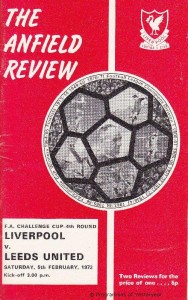 “On what grounds are you applying to read English at Liverpool of all places?” my mystified English teacher asked me. How could I tell him the grounds were Anfield and Goodison Park?
“On what grounds are you applying to read English at Liverpool of all places?” my mystified English teacher asked me. How could I tell him the grounds were Anfield and Goodison Park?